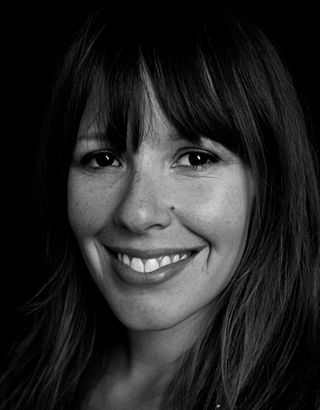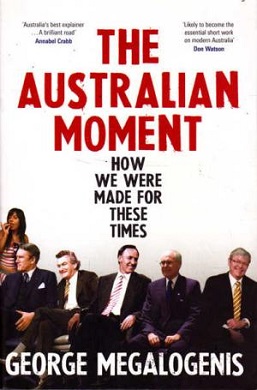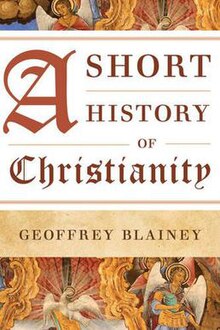
The Fatal Shore: The Epic of Australia's Founding is a 1986 book by Robert Hughes. It provides a history of the early years of British colonisation of Australia, and especially the history and social effects of Britain's convict transportation system. It also addresses the historical, political and sociological reasons that led to British settlement. It was first published in 1986.

Martin Emil Marty is an American Lutheran religious scholar who has written extensively on religion in the United States.
Hal Gibson Pateshall Colebatch was a West Australian author, historian, poet, lecturer, journalist, editor, and lawyer.
Geoffrey Norman Blainey is an Australian historian, academic, best selling author and commentator. He is noted for having written authoritative texts on the economic and social history of Australia, including The Tyranny of Distance. He has published over 40 books, including wide-ranging histories of the world and of Christianity. He has often appeared in newspapers and on television. He held chairs in economic history and history at the University of Melbourne for over 20 years. In the 1980s, he was visiting professor of Australian Studies at Harvard University. He received the 1988 Britannica Award for 'exceptional excellence in the dissemination of knowledge for the benefit of mankind', the first historian to receive that award and was made a Companion of the Order of Australia in 2000.

The Catholic Church and Judaism have a long and complex history of cooperation and conflict, and have had a strained relationship throughout history, with periods of persecution, violence and discrimination directed towards Jews by Christians, particularly during the Middle Ages.
Atheism, in the broadest sense, is an absence of belief in the existence of deities. In a narrower sense, atheism is specifically the position that there are no deities and any statements to the contrary are false ones. The English term 'atheist' was used at least as early as the sixteenth century and atheistic ideas and their influence have a longer history.

A History of Christianity is a 1976 study of the history of Christianity by the British historian Paul Johnson. It has since been reissued and updated. The author aims to present a comprehensive factual history of the Christian religion.
Stuart Forbes Macintyre was an Australian historian, and Dean of the Faculty of Arts at the University of Melbourne from 1999 to 2008. He was voted one of Australia's most influential historians.
The University of Chicago Divinity School is a private graduate institution at the University of Chicago dedicated to the training of academics and clergy across religious boundaries. Formed under Baptist auspices, the school today lacks any sectarian affiliations.
The Prime Minister's Prize for Australian History was created by the Prime Minister of Australia, John Howard following the Australian History Summit held in Canberra on 17 August 2006. The Summit looked at how the Australian government could strengthen Australian history in the school curriculum. The winner receive a gold medallion and a grant worth A$100,000.

A Short History of the World is a general history non-fiction book written by Australian historian Geoffrey Blainey. First published in 2000 by Penguin Books, it describes over 4 million years of history, from before the first people left Africa, through to the current day.

Tara June Winch is an Australian writer. She is the 2020 winner of the Miles Franklin Award for her book The Yield.
George Megalogenis is an Australian journalist, political commentator and author.
The Australian Prime Minister's Literary Awards (PMLA) were announced at the end of 2007 by the incoming First Rudd ministry following the 2007 election. They are administered by the Minister for the Arts.

Women in Church history have played a variety of roles in the life of Christianity - notably as contemplatives, health care givers, educationalists and missionaries. Until recent times, women were generally excluded from episcopal and clerical positions within the certain Christian churches; however, great numbers of women have been influential in the life of the church, from contemporaries of Jesus to subsequent saints, theologians, doctors of the church, missionaries, abbesses, nuns, mystics, founders of religious institutes, military leaders, monarchs and martyrs.
Bruce Pascoe is an Aboriginal Australian writer of literary fiction, non-fiction, poetry, essays and children's literature. As well as his own name, Pascoe has written under the pen names Murray Gray and Leopold Glass. Since August 2020, he has been Enterprise Professor in Indigenous Agriculture at the University of Melbourne.
A History of Christianity may refer to:

The Australian Moment: How We Were Made For These Times is a 2012 Australian economics book by George Megalogenis. It explains how Australia has been able to weather recent world economic problems relatively unscathed.
Francis Robert Bongiorno, is an Australian historian, academic and author. He is a professor of history at the Australian National University, and was head of the university's history department from 2018 to 2020. Bongiorno is the President of the Australian Historical Association.
Meredith Lake is an Australian author, historian of religion and broadcaster.








